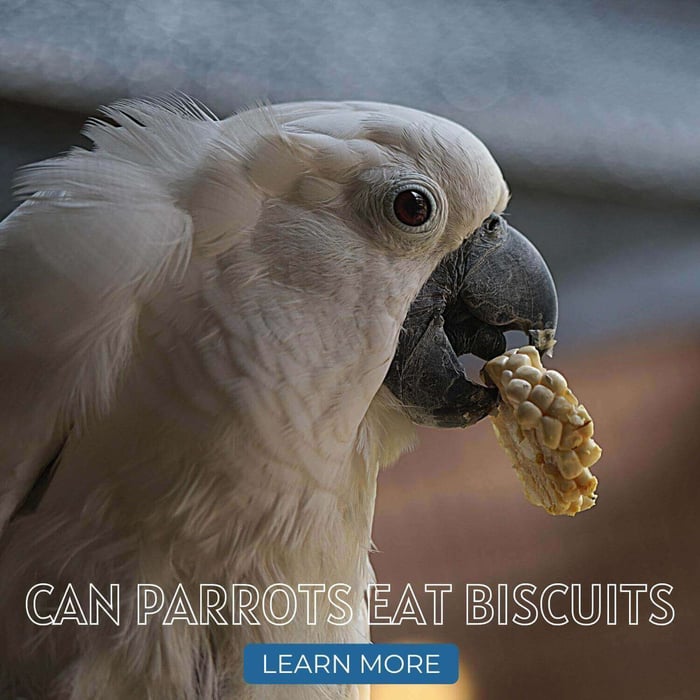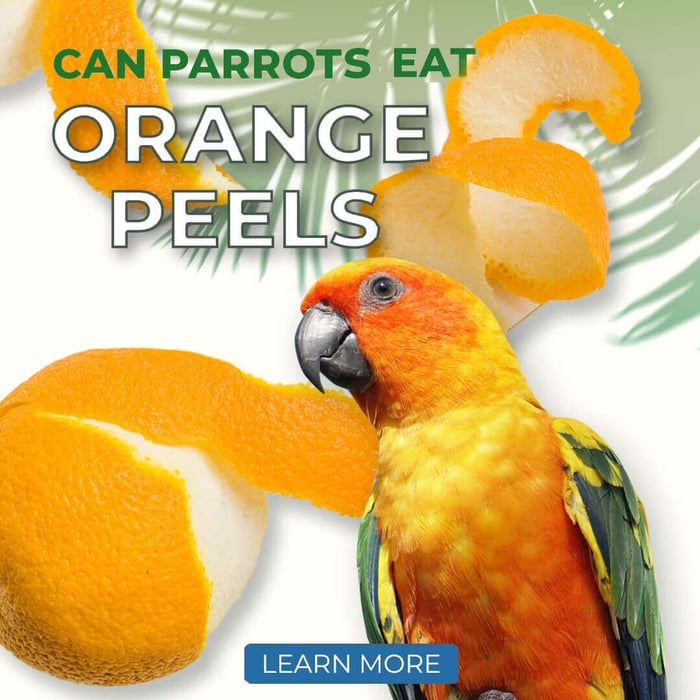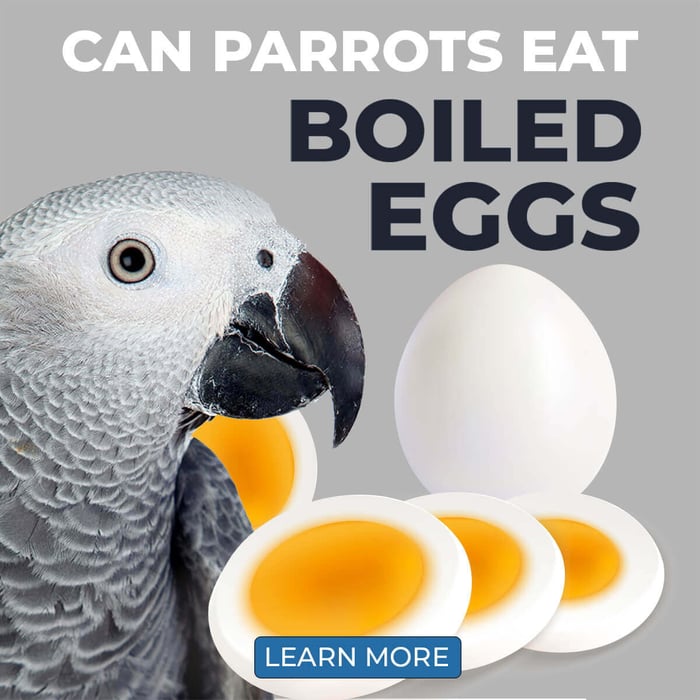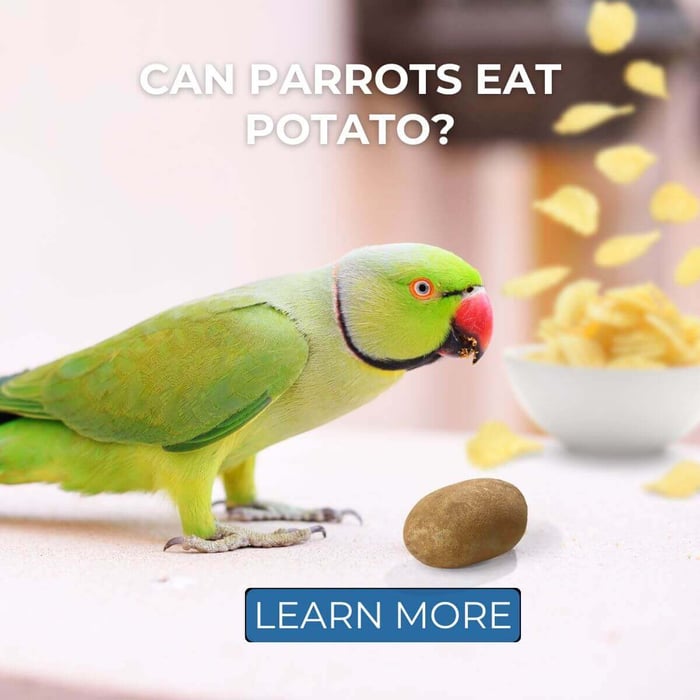Can Parrots Eat Chocolate? Basic Facts You Need To Know
Having some chocolate and wondering whether you can share a little with your parrot? Our feathered pets love to get involved in everything we do (and especially with everything we eat!), but can parrots eat chocolate?
Keep reading to find out everything you need to know about parrots and chocolate.
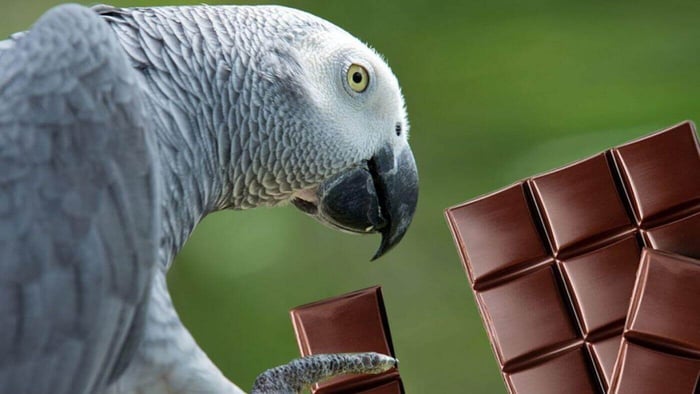
Chocolates are Not Safe for Birds
Can parrots eat chocolate? The answer to this question is Absolutely Not. Chocolates and birds don't go together. It's a very bad idea to feed any bird any type of chocolate, and that includes parrots.
Chocolate can trigger severe health complications in birds. They can even prove fatal, as a bird's digestive system isn't able to process and break down the chemical substances that chocolates contain.
Chocolate is Toxic to Most Animals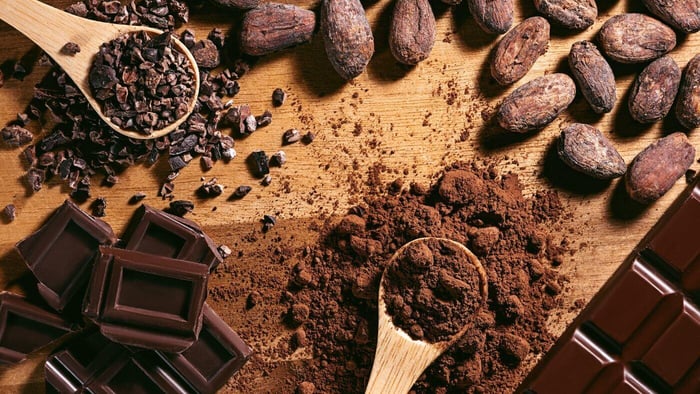
Chocolates are no doubt among humans' favourite treats. We haven't met many, many people who don't love them! But this doesn't just apply to people; animals love chocolates, too.
The downside here, however, is that animals, unfortunately, don't usually know what's good for them. While humans can eat chocolate with little or no side effects (aside from the sugar buzz), we can't say the same for most animals.
Research has shown that most animals don't have the stomach for chocolates. When you feed chocolate to birds specifically, things can unfortunately go wrong very quickly. So, even though your pets will absolutely beg for you to share some of your snacks with them, you need to realise you can't actually feed them everything.
Wondering what the fuss about chocolate is? This article is for you if you'd like to know why parrots can't eat chocolate.
Caffeine and Theobromine
Chocolate contains caffeine and theobromine, two chemicals that are actually harmful to most animals. In fact, it's generally well-known that theobromine can be fatal to dogs. While humans can metabolise theobromine and caffeine efficiently, animals cannot.
According to veterinarian Kevin Fitzgerald: "The buzz we get from eating chocolate may last 20 to 40 minutes, but for dogs, it lasts for many hours. After 17 hours, half of the theobromine a dog has ingested is still in the system."
So even though parrots are omnivores, just like dogs, there are certain things they should never eat. The caffeine and theobromine that chocolate contains make it poisonous to parrots. They can, in fact, cause a collapse of the bird's vital organs, like the liver and nervous system.
Dark Chocolate Poses the Greatest Danger
Dark chocolate contains the highest levels of theobromine, more than any other type of chocolate available. Only a very small amount of dark chocolate ingested is enough to poison a parrot. Milk chocolate contains moderate amounts of theobromine, while white chocolate has none at all.
This is not to suggest that milk or white chocolates are safer for your parrots. Milk chocolate is still damaging to your bird's health since it is packed with more sugar than its dark counterpart. Refined sugar is bad for animals, just like caffeine and theobromine are. Not to mention the sky-high fat content!
To put it plainly: do not feed your parrot any snacks or treats that contain chocolate. This includes chocolate biscuits, chocolate cookies, chocolate ice creams, chocolate bread, chocolate crackers, and so on. If it contains chocolate, even in small amounts, then it's not safe for your parrot.
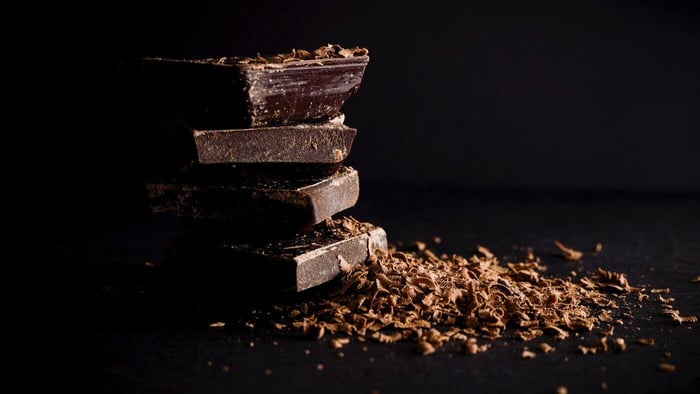
Slow Poison
It's important to remember that parrots are small animals. Their body system and immunity are built differently than those of us humans. The effects of chocolate toxicity or poisoning may not show overnight. It can be a slow process, but you can be sure it's going to lead to trouble in the end.
If you've fed your parrot chocolate before and nothing happened, this still doesn't mean you should continue. You should stop immediately if you want your parrot to be around and have a healthy life for much longer.
The more chocolate you give to your parrot, the more you expose your pet to a potential system and organ failure. Feeding parrots with chocolate is a disaster that is just waiting to happen.
Symptoms of Chocolate Poisoning
Now that you know chocolates and Polly the Parrot are never a good mix, what are the signs you should look out for if you think your feathered pet has gotten into your chocolate supply?
Symptoms of chocolate poisoning in parrots include:
- Feather plucking, usually around the face and head
- Appetite loss (or vomiting)
- Vomiting
- Polydipsia (constant thirst)
- Polyuria (urinating frequently)
- Diarrhoea
- Bird suffers seizures, muscle tremors and loss of balance
- Lethargy – The bird seems dull, not its usually feisty/bubbly self
Due to the nature of birds' immune systems, the effects of chocolate poisoning will begin to show within hours of ingestion. However, the exact symptoms a bird will show will depend largely upon the amount of chocolate it consumed. In some cases, the parrot may not even show any symptoms at all but don't be fooled. The damage is done, and sooner or later, it will show.
Especially if your parrot consumes chocolate on a regular basis, yes, even in very small quantities, it is still harmful to your bird.
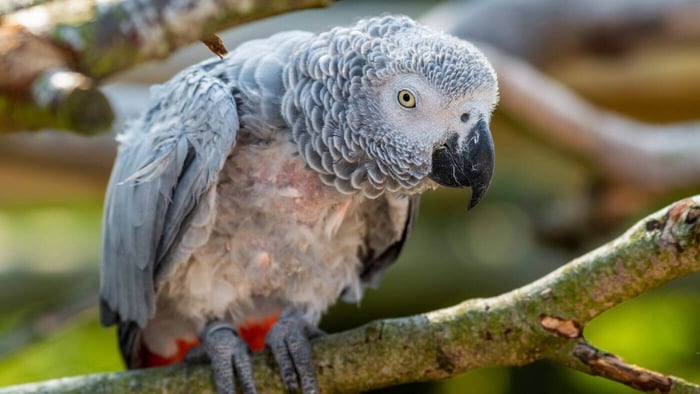
How Much Chocolate Can Kill A Parrot?
As mentioned above, most of the symptoms a bird will show after eating chocolate will depend on the type and amount of chocolate consumed. According to studies, as little as 100 grams could be enough to seal your parrot's fate. For smaller parrots, the quantity is much less.
That's why it's not advisable to give your bird any chocolate at all, not even a small bite. Just keep it safe and happy by feeding it harmless and healthier parrot treats that don't contain theobromine or caffeine!
What to Do If Your Parrot Eats Chocolate
Okay, so you just found out your parrot munched on some chocolates. What next? Well, if you know or suspect that your parrot has eaten chocolate, it's important to act quickly. Don't panic or try to administer treatment yourself (unless you're a vet, you'll probably only make things worse for the bird).
The first step you should take is to call your avian vet immediately. Prompt medical intervention is what will hopefully get your bird through this incident without permanent damage. If you're not sure who to ring, have a look at our list of avian vets in the UK.
The type of treatment the vet will suggest will be based on the amount of chocolate that the parrot ate, so bring the wrapper and try to figure out how much it ingested. In most cases, the vet's first approach would be to administer drugs to control symptoms. The symptoms shown will help indicate how far the chocolate poisoning has gone.
By the way, don't wait to see symptoms before you call your vet. By the time your parrot starts showing signs of chocolate poisoning, it may, in severe cases, already be too late to do anything.
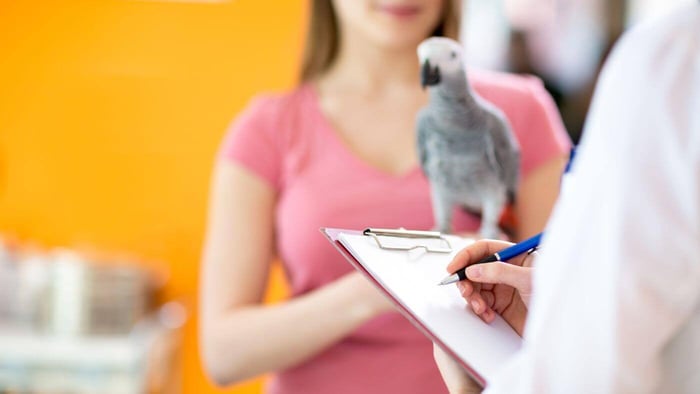
What Can Your Parrot Eat, Instead Of Chocolate?
So what can your parrot eat safely without risk to its wellbeing? Parrots are actually omnivores, although they lean towards herbivorism. They're not fussy eaters; they can eat most food types available (but not chocolates!).
A balanced diet for your feathered pet should ideally consist of a parrot pellet as a staple parrot food, supplemented with plenty of fresh fruit and vegetables. You can leave vegetables available for the bird to snack on throughout the day and offer fruit a few times a week. A high-quality seed mix is also a good addition, especially if you sprout the seeds. Just make sure you offer plenty of variety to keep things from becoming dull and to make sure your parrot gets all the (micro)nutrients it needs to thrive!
A proper diet is a very important factor in keeping any animal healthy. If you need more information, be sure to do some further reading. You can start with the article on foods for parrots.
Other Unsafe Foods for Parrots
This point is important too. As a pet lover, you need to know that there are more foods you can't feed your parrot than just chocolate. It's easy to slip into one error while you're trying to avoid the other.
If you go through the trouble of keeping chocolates away from your bird, you want to be sure you're not going to give the parrot a different food type that could be equally hazardous to its health. Otherwise, what's the whole point?
So, to cut to the chase, here are examples of foods that could mean problems for Polly the Parrot:
- Avocados are definitely off the menu. They may be yummy to people, but they contain persin, a chemical that's potentially deadly to birds.
- Foods like coffee, tea, soda, and energy drinks are not a good idea either. They contain caffeine, which, as we've discussed, is toxic to birds. Caffeine can trigger symptoms like increased heart rate, tremors, and seizures.
- Drinking alcohol may give you the kicks, but it may mean death if you give some beer or other alcoholic beverages to your parrot.
- Foods like onions, garlic, and salt are also on the list of things you should avoid unless they are in very small quantities.
These foods can cause symptoms like drowsiness, breathing difficulty, vomiting, anaemia, diarrhoea, dehydration, liver problems, and death. Have a look at the article on foods that parrots can and cannot eat for further reading!
Take Preventive Measures
Since we know now that eating chocolate is unsafe for parrots, you might want to take preventive measures to keep disaster at bay. As they say, it's better safe than sorry.
So, what can you do to keep your parrot from suffering chocolate poisoning?
- First, keep chocolates as far away from your parrot as possible. Don't leave chocolate wrappers, crumbs, or anything containing chocolate around. We've said it already: even the smallest amount of chocolate can give your parrot a tummy ache.
- It's best to keep chocolates and chocolate-based products in the cupboard or other secured places where your parrot cannot see them or get to them.
- If you have children at home, make sure they know not to play pranks when you're not looking, or keep snacks like chocolate locked away if you can't be sure. Children can be… well, children. They may just hand the parrot a nice piece of chocolate cookie when you're not looking.
- Perhaps you shouldn't eat chocolates anywhere around your parrot. This will prevent the temptation of you succumbing to pity when your parrot beseeches you for a bite (because, trust us, it will!).
- Always wash your hands after eating chocolate products, especially if you're going to tend to your parrot soon after. Even though chocolate leftovers on your fingers may not wind up in your parrot's beak, it's best to be on the side of caution.
Conclusion: Can Parrots Eat Chocolate?
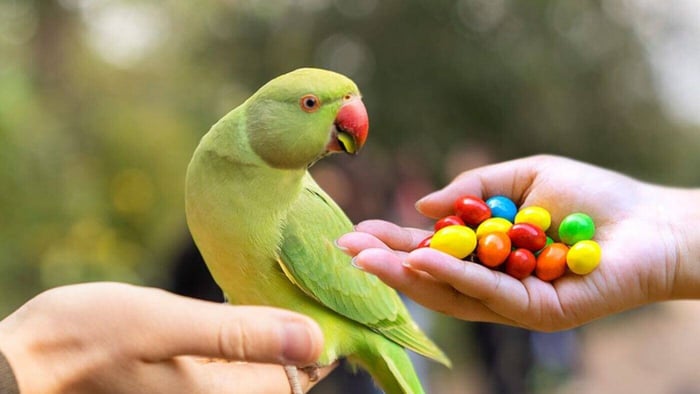
We can't emphasise this point enough: chocolate is dangerous to parrots. It can lead to several health complications. In severe cases, chocolate toxicity can even cause death.
Remember that a suitable diet is one of the most important factors in keeping your parrot happy and healthy in the long run. As much as you want to treat it like a member of your family, you just cannot share all of your meals with a bird. It needs food that is meant for parrots.
Any food or snack that has chocolate as one of its components should be avoided altogether. Chocolates in all their forms and sizes are just not a good idea. They should always be kept where your bird can't get to them. If you know (or suspect) your parrot has eaten some chocolate, call your vet immediately.
If you have any more questions about Can parrots eat chocolate? or if you'd like to share your own experiences with parrot nutrition, feel free to leave a comment below.

